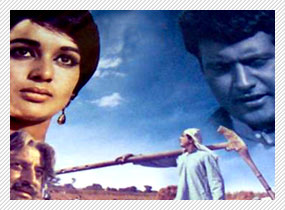It is a reflection of the ironic times we live in, that farmers in Uttar Pradesh were mowed down by a VIP car, a day after the birth anniversary of Lal Bahadur Shastri who coined the slogan, Jai jawan! Jai kisan!
Even as politicians seem to have forgotten him, a good way for lesser folks to remember his vision might be through cinema, by watching the film Upkar. It was on Prime Minister Shastri’s suggestion that actor-writer-director Manoj Kumar made this film, based on his rallying call.1965 was a difficult year for the man at the helm of the country. Apart from Pakistan’s invasion of our territory, a poor monsoon had caused a critical food shortage and Shastri had to fight on several fronts. Holding the country together at such a time was a herculean task, but the diminutive man rose to the occasion. Jai jawan! Jai kisan! was not just a catchy phrase, it was at the centre of the PM’s planning.
Manoj Kumar was so inspired after meeting him that he wrote the story of Upkar at one stretch, on the train journey back to Bombay, from Delhi. To his immense credit, as we watch this patriotic film, more than half a century later, it stands the test of time; though it is an abysmal shame that the malpractices, exposed in the film, continue to flourish.
Upkar is not about a rich, businessman farmer. Bharat, the film’s hero, played by Manoj Kumar, cannot afford even a tractor but he works hard, and happily so, to grow food for his countrymen. An upright man of the soil, he confronts Lalaji, a middleman, for hoarding grains, creating an artificial scarcity and then selling them at exorbitant prices. “Aap hamare paseenon se logon ka khoon chooste hain!” he reprimands, angrily; and decides that he, and fellow kisans would, henceforth, sell their produce directly, at the mandis, at affordable prices, bypassing the middleman. Not to be outdone, the crafty Lalaji,conspiring with other vested interests, forces Bharat out of his land.
Manoj Kumar gave both, the kisan and the jawan of Shastri’s slogan a cinematic voice. In a telling scene, against an installation of a gun and a plough, an army Major tells Bharat that the mutual trust between a soldier and a farmer was invincible. The two were inter-dependent, as well. Symbolically, the Major, played endearingly by actor David, often tucks into roti-saag with the villagers. Later, he recruits Bharat in the army.
The opening scenes of the film, shot on the farmlands of a village, Nangal Thakran, near Delhi, are idyllic, portraying a Utopian village where men and women join hands to grow food and sing paeans to their motherland.
Cracks appear in this happy scenario when Bharat’s city-educated brother, Puran, tells him to leave the village to improve his prospects. Bharat counters earnestly, “City dwellers work hard to fill their stomach. But the anaj to fill stomachs grows in the fields. If everyone migrates to the cities who will grow the anaj? As it is, we don’t grow enough and have to import grains from other countries.” As a dialogue-writer, Manoj Kumar cited hard facts to bolster Bharat’s argument, as we were, indeed, buying wheat from the US, under the controversial PL 480 agreement, at the time.
Supporting Bharat in his stand is an idealistic, urban doctor who has set up a clinic in his village. Played by Asha Parekh, Dr Kavita eulogises village life and promotes family planning. Dire food shortages had caused the government to introduce population control measures, and Manoj Kumar wove this angle, too, into the plot seamlessly.
As he did scenes of war. Ousted from his land, Bharat joins the army and fights against the enemy as fervently as he tilled the soil. A skilfully-written screenplay enabled Manoj Kumar to embody both the dramatis personae of Shastri’s tagline. Today, the film may seem a bit melodramatic, but the circumstances in 1965, when it was conceived, and in 1967, when it hit the theatres, were different. Viewers thronged to see it and the actor became synonymous with Bharat, forever.
In the final scene, Bharat emerges victorious, notwithstanding the loss of his arms. With Lalaji behind bars and a reformed Puran ploughing the land, the village returns to its Utopian state, with Mere desh ki dharti being sung with renewed gusto. Ever since, the song is played, unfailingly, on every Independence Day.
Unfortunately, Shastri passed away in mysterious circumstances before the film was completed and he didn’t see his slogan immortalised on screen. Unfortunate, too, that his values are all but forgotten…The plight of the small farmer remains the same, trapped in a web of politics, commerce, and middlemen; his voice drowned in a cacophony of powerful voices with vested interests.













